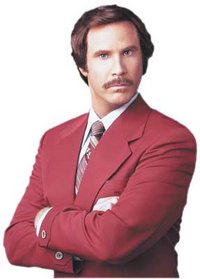Friday, December 15, 2006
Is "The Good German" good?

You're probably sick of this little obsession of mine by now, so I promise that this is our last post on this distressing matter, at least until I see the movie.
By way of some explanation, one of our themes here has become my ... what's the word, sorrow, sadness, disappointment? ... when perfectly good ideas are debased by the creatively stunted halfwits who make most of the crap that comes out of Hollywood these days. However, this doesn't really seem to be the problem with "The Good German." The problem, I am beginning to think, is not a lack of ideas but a surfeit of them. "The Good German" seems to be Mr. Soderbergh in "experimental" mode. The question of whether such experimentalism is likely to engage an audience seems to be beside the point. Here's Magnolia Darkness from today's NY Times (comparing it with "Casablanca"):

while the language routinely waxes raw in "The Good German," the most striking difference between it and a Hollywood film like "Casablanca" aren't the expletives, the new film's calculated cynicism or even that glimpse of bedroom coupling; it's that the older film feels as if it was made for the satisfaction of the audience while the other feels as if it was made for that of the director alone.
In the film laboratory that is Mr. Soderbergh's brain, ideas boil, steam and sputter. In 1989 he conquered Cannes and launched a thousand Harvey and Bob Weinstein stories with his independently financed sensation "Sex, Lies and Videotape," quickly becoming a legend before his time. He subsequently flopped and floundered before he brought his independent ways to bear on the studio apparatus, a metamorphosis that involved turning a television actor into the sexiest man alive, repurposing the Rat Pack and winning an Oscar.
It has been a second act that, until recently, seemed as smart as the man living it but that has grown gradually more disjointed as Mr. Soderbergh's penchant for experimentation has become an end in itself rather than a means to aesthetic liberation. That's too bad for us, for him and for Hollywood, which frankly could use all the help it can get....
Increasingly, Mr. Soderbergh's oscillation between glossy divertissements like the "Ocean's" films and modest diversions like "Bubble" seems less like the natural workings of a restless imagination than a disengaged one. Even more than "Bubble" or "Ocean's Twelve," "The Good German" feels like the product of a filmmaker far more interested in his own handicraft--in the logistics of moving the camera among the characters with a dip and a glide--than in the audience for whom he's ostensibly creating that work.
The comparison with "Casablanca," which Soderbergh clearly invites, does not come out in has favor: "Manufactured for mass enjoyment, "Casablanca" runs wonderfully more than half a century after leaving the factory. It's sentimental and contrived. It's also the kind of well-wrought, pleasurable film that Mr. Soderbergh can do beautifully (see "Out of Sight") and seems recently reluctant to pursue."
Also in today's Times, Princess Diana not murdered by "MI5, MI6, the Mossad, the C.I.A., the N.S.A., the Freemasons, the Scientologists, the military-industrial complex or a cabal of sinister British establishment figures led by Queen Elizabeth II's 85-year-old husband, Prince Philip." What a relief.
Posted by jwb at 8:30 AM

2 Comments:
Bram said:
Well, another "good" movie that previewed before Casino Royale (though I guess it's been getting hype for some time) is getting positive reviews — The Good Shepherd. WaPo and NYT have got me interested, a logical extension of my hangup on The Company.
at 8:50 AM
jwb said:
I'm curious about this one too. The trailer was far more interesting than others I've mentioned. It's loosely based on the story of James J. Angleton, who was the counter-espionage czar at the CIA for a long time. I'm anxious to see it.
at 8:20 AM


